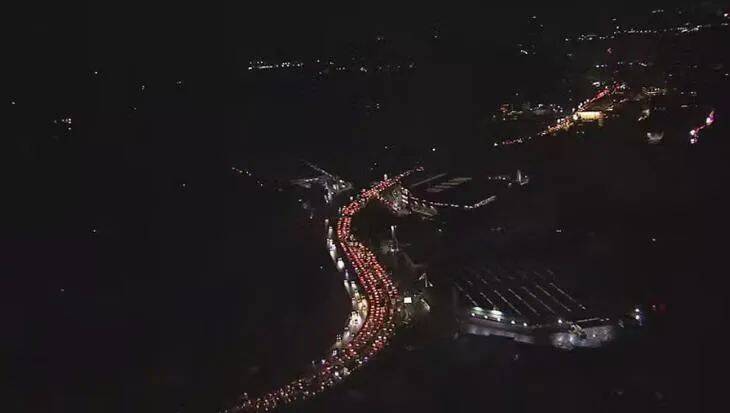The cumulative loss is 1.65 billion yuan! Severe weather in Brazil has serious impact
According to Brazilian media reports, the state of Sao Paulo was earlier hit by a severe storm accompanied by record strong winds, killing at least seven people and power outages for 2.1 million residents and business users. Currently, power has been restored in most of the areas affected by the storm, but the state has lost 1.6 billion reais due to power outages, according to Enel SP.
According to the report of the power company, the number of affected residents has been updated to 3.1 million from 2.1 million previously reported. However, most of the residents affected by last week's storm have returned to power supply, and only about 36000 households still have no power supply. It's still under repair.
Although the report points out that the recovery rate of power supply after this blackout is much faster than that of last year, the impact is very serious. According to the survey and statistics conducted by the Association of goods, Services and Tourism of the State of Sao Paulo (FecomercioSP), on the fourth day of the blackout, a number of industries caused a cumulative serious loss of 1.65 billion reais, but this figure is the income that these enterprises could not record during the blackout, as well as some basic losses, so the actual loss figure will be even higher.

The federation said that the state of Sao Paulo, as the largest city in Brazil, is the largest economic, trade, commercial, financial, logistics and transportation center in Brazil and even in South America, and its industry is so developed that there should not be repeated power outages. what is more, there should not be prolonged blackouts in such incidents, with some areas without power for more than a week as users experienced blackouts at the end of 2023. The power shortage has not only had a significant impact on public life, but also brought huge economic losses to the business community.
It is reported that Sao Paulo is the most important industrial state in Brazil, with steel, automobiles, aircraft and electronics, as well as textile, food processing, paper and other industries. Power outages make enterprises face problems such as overstock and non-delivery. Many companies are recording economic losses, and some important manufacturers have to maintain the operation of their equipment by generating generators, hiring extra labor or buying fuel, which increases their operating costs. In addition, nearly 400 tree collapses were reported, affecting road facilities and logistics and transport.
In addition, the storm was the strongest weather event in the region since 1995, with winds of up to 107.6 kilometers per hour, causing serious wind damage, causing damage not only to power supply facilities, but also to the state's agriculture. Although the rainfall has effectively alleviated the recent dry and high temperature climate, due to the strong wind, it has directly damaged some plants, trees and fruits, especially coffee trees, and is currently in the flowering period of the new coffee production season in Brazil, resulting in a decline in coffee production.
And the storm occurred only in the Sao Paulo area of Brazil and did not affect other areas much. It is reported that only part of Minas Gerais, Brazil's largest coffee producing region, receives very little rainfall, so most of the state is still affected by dry and hot weather.

According to the Brazilian Meteorological Department, the historical average monthly rainfall in Minas is 1300-2000 mm, but due to drought, the rainfall since August has been very low, or even no rain. In October, the rainfall was only 27.16 mm, which could not alleviate the drought, and the high temperature in the state continued, with a maximum temperature of 38 °C and an average temperature of 28.5 °C, which was not conducive to the growth of coffee crops.
As a result, according to Conab, Brazil's official agency, recent drought, lack of rainfall, high temperatures and other climatic conditions have reduced productivity prospects, resulting in a final yield reduction of 1.9 per cent only 28.8 bags per hectare, with a total yield of about 4 million bags less than in 2023.
For more information about coffee producing areas, please scan the code directly and follow: coffee comments.
Long press the QR code to follow:
Important Notice :
前街咖啡 FrontStreet Coffee has moved to new addredd:
FrontStreet Coffee Address: 315,Donghua East Road,GuangZhou
Tel:020 38364473
- Prev

After drinking Manner's new products,"a concert will be held on your stomach"?!
▲ Click to pay attention| Daily Boutique Coffee Culture Magazine Coffee Workshop Recently, Manner and Pudong Art Museum once again jointly collaborated to launch a limited canvas bag inspired by Joseph Marod William Turner's "Blue St. Regis Mountain, sunrise" and a new grilled caramel-flavored latte. Last December, M
- Next

What do "AA" and "Top" of Kenyan coffee beans mean?
Kenyan coffee has always been famous around the world for its distinctive and complex berry acid aroma, sweet sugar cane and juice-like acidity, and is loved by coffee lovers around the world. However, when you buy Kenyan coffee beans, you will find that most of the coffee produced and exported in Kenya will appear "AA"
Related
- What grade does Jamaica Blue Mountain No. 1 coffee belong to and how to drink it better? What is the highest grade of Blue Mountain coffee for coffee aristocrats?
- What are the flavor characteristics of the world-famous coffee Blue Mountain No. 1 Golden Mantelin? What are the characteristics of deep-roasted bitter coffee?
- Can I make coffee a second time in an Italian hand-brewed mocha pot? Why can't coffee be brewed several times like tea leaves?
- Hand-brewed coffee flows with a knife and a tornado. How to brew it? What is the proportion of grinding water and water temperature divided into?
- What is the difference between Indonesian Sumatra Mantinin coffee and gold Mantinin? How to distinguish between real and fake golden Mantelin coffee?
- What does bypass mean in coffee? Why can hand-brewed coffee and water make it better?
- Unexpected! Ruixing Telunsu lattes use a smoothie machine to foam milk?!
- % Arabia's first store in Henan opens into the village?! Netizen: Thought it was P's
- Does an authentic standard mocha coffee recipe use chocolate sauce or powder? Mocha Latte/Dirty Coffee/Salty Mocha Coffee Recipe Share!
- What is the difference between Vietnam egg coffee and Norway egg coffee? Hand-brewed single product coffee filter paper filter cloth filter flat solution!

